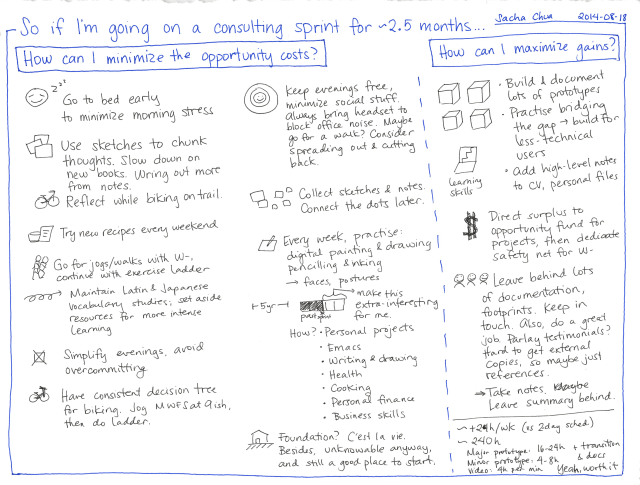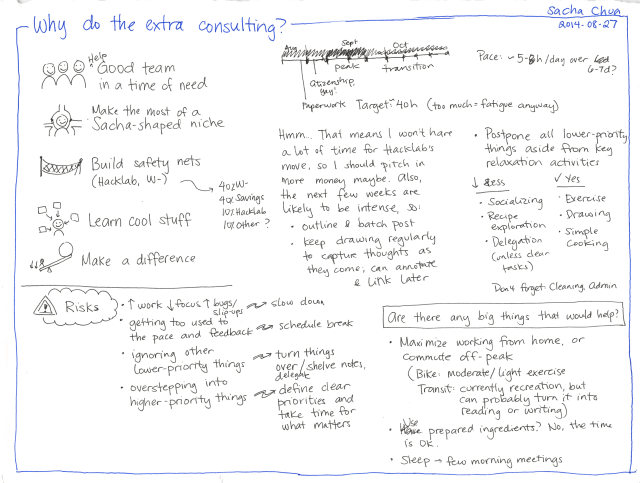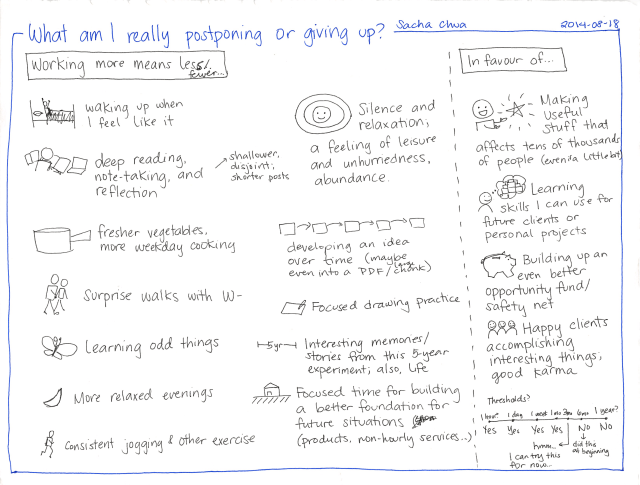Doing more consulting
Posted: - Modified: | business, experimentAs I mentioned previously, I've been doing a lot more consulting than I originally planned. At this point, I had been thinking of keeping my twice-a-week schedule for a few months, and then tapering down to the equivalent of one day a week, and then eventually letting go of it entirely. That might still happen. In the meantime, though, my primary client needs some extra help. I still carve out time to work on my own stuff, but I'm willing to postpone some of the things I could be working on because I can see how a little extra work now could create a lot more value for the client. Besides, it's a good excuse to learn more about some of the things I'm curious about.
A couple of weeks ago, I wrote a little about testing out this pace and observing what I ended up swapping out. It turned out that Harold Jarche had been thinking about similar things, and we chatted a little about it over lunch. (Yay lunch with people!) I mentioned I'd been fleshing out in more details the little things that tend to get put aside if I make work my default activity (at least until I reach 40 hours a week), and why I'm willing to make the trade.
On reflection, though, I can still make time for many of these activities or experiences if I use my time smartly. For example, I can still get enough sleep if I'm careful about morning meetings and late-night browsing. I can still work from home from time to time, which leads to afternoon walks to libraries and more relaxed evenings. I still exercise, actually, so that's not one of the trades (it only feels that way). Deep reading and a feeling of leisure usually requires one of those open weekdays when I don't have any work planned, but I get something similar to that feeling if I spend some time reflecting on what I've learned and drawing my thoughts.

2014-08-18 So if I'm going on a consulting sprint for 2.5 months – #experiment #business #consulting
Time is never static. Your day shifts in response to different priorities and stimuli. The stuff I'm learning and doing now is a good use of the time, but it's also good to be aware of the flip side–even if it's idealized, even if in reality some of those open days might be spent mostly napping and skimming books and wandering around trying to figure out thoughts. Knowing what I might be missing helps me mitigate those opportunity costs and remind myself: Yes, I am deliberately postponing this part and dropping that part and scaling back that other part, but it's for this reason, so I should make the most of that opportunity. Then I can remind myself to re-evaluate things at a certain point, so that this new balance doesn't become too routine. Otherwise you get used to the way things are, and then you wonder what you ever did with so much time in the first place. =)



1 comment
Mom
2014-09-06T00:36:59ZI just turned down a special teaching job (special because these two classes are not offered this term, but would be to three students who are graduating) so that I could devote one day a week to clearing out stuff (donate books, shred old papers, give away things in the house, office and studio, that I don't need). I'd like to keep what we own to the barest minimum, and resist the temptation to buy things. Friends also need to be told not to give me gifts - except perhaps for plants that are not hard to take care of. Wednesday - my usual teaching day - will now be my clearing out day. Thursday will remain my writing day.